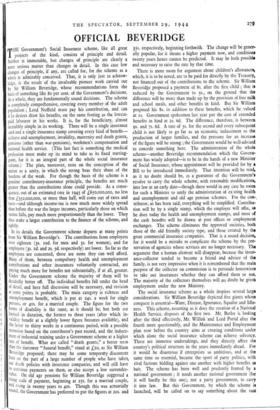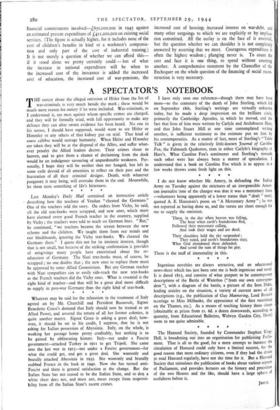OFFICIAL BEVERIDGE
THE Government's Social Insurance scheme, like all great I projects of the kind, consists of principle and detaiL Neither is immutable, but changes of principle are clearly a more serious matter than changes in detail. In this case few changes of principle, if any, are called for, for the scheme as a whole is admirably conceived. That, it is only just to acknow- ledge, is the result of the invaluable pioneer work carried out by Sir William Beveridge, whose recommendations form the basis cf something like 8o per cent. of the Government's decisions. As a whole, they are fundamentally sound decisions. The scheme is completely comprehensive, covering every member of the adult population ; Lord Nuffield must pay his contribution, and can if he desires draw his benefits, on the same footing as the lowest- paid labourer in his works. It is, for the beneficiary, almost incredibly simple in its working. There will be a single insurance card and a single insurance stamp covering every kind of benefit— sickness and unemployment, invalidity, maternity and death grants, pensions (other than war-pensions), workmen's compensation and national health service. (This last fact is something the medical profession must make up its mind to take as its fixed starting- point, for it is an integral part of the whole social insurance scheme.) The plan, moreover, rests on the conception of the nation as a unity, in which the strong bear their share of the burdens of the weak. For though the basis of the scheme is a genuine contributory-insurance principle, the benefits are much greater than the contributions alone could provide. As a conse- quence, out of an estimated cost in 1945 of £650,000,000, no less than £352,000,000, or more than half, will come out of rates and taxes —and although income-tax is now much more widely spread than before the war the larger incomes, particularly those on which surtax falls, pay much more proportionately than the lower. They thus make a larger contribution to the finance of the scheme, and rightly.
In its details the Government scheme departs at many points from Sir William Beveridge's. The contributions from employees over eighteen (3s. rod. for men and 3s. for women), and for employers (3s. rd. and 2S. 5d. respectively) are lower. So far as the employees are concerned, these are sums they can well afford. Many of them, between compulsory health and unemployment contributions and other insurances voluntarily contracted, are paying much more for benefits not substantially, if at all, greater. Under the Government scheme the majority of them will be decidedly better off. The individual benefits fall under the head of detail, and here full discussion will be necessary, and revision at some points is probable. The main category is sickness and unemployment benefit, which is put at 24s. a week for single persons, or 4os. for a married couple. The figure for the two forms of disability is the same, as it should be, but both are limited in duration, the former to three years (after which in- validity benefit at a slightly lower figure becomes available), and the latter to thirty weeks in a continuous period, with a possible extension based on the contributor's past record, and the induce- ment of industrial training under a Government scheme at a higher rate of benefit. What are called " death grants," a better term than the narrower " funeral benefit," stand at £20, as Sir William Beveridge proposed; there may be some temporary discontent here on the part of a large number of people who have taken. Out death policies with insurance companies, and will still have to continue payments on them, or else accept a low surrender- value. On old, age pensions Sir William Beveridge suggested a rising scale of payment, beginning at 25s. for a married couple, and rising in twenty years to 4os. Though this was actuarially sound, the Government has preferred to put the figures at 20S. and 35s. respectively, beginning forthwith. The change will be genet% ally popular, for it means a higher payment now, and conditions twenty years hence cannot be predicted. It may be both possibls and necessary to raise the rate by that time.
There is more room for argument about children's allowances, which, it is to be noted, are to be paid for directly by the Treasury, not financed out of the contributions to the scheme. Sir William Beveridge proposed a payment of 8s. after the first child ; that is reduced by the Government to 5s., on the ground that the difference will be more than made up by the provision of free milk and school meals, and other benefits in kind. But Sir William proposed his 8s. in addition to these benefits, which he valued at is. Government spokesmen last year put the cost of extended benefits in kind at 2s. 6d. The difference, therefore, is between 9s. and 7s. 6d. A rate of 5s. for the second and every subsequent child is not likely to go far as an economic inducement to the production of larger families, and the pressure for an increase of the figure will be strong ; the Government would be well-advised to concede something here. The administration of the whole scheme—another Beveridge recommendation which the Govern- ment has wisely adopted—is to be in the hands of a new Minister of Social Insurance, whose appointment will be provided for by a Bill to be introduced immediately. That intention will be read, as it no doubt should be, as a guarantee of the Government's resolve to carry the whole scheme, with reasonable modifications, into law at an early date—though there would in any case be room for such a Minister to unify the administration of existing health and unemployment and old age pension schemes. For the con-, tributor, as has been said, everything will be simplified. Contribu- tion will be by a single stamp, which the employer will affix, as he does today the health and unemployment stamps, and most of the cash benefits will be drawn at post offices or employment exchanges. The scheme eliminates the approved societies, both those of the old friendly society type, and those created by the great commercial insurance companies. That is a sound decision, for it would be a mistake to complicate the scheme by the pre- servation of agencies whose services are no longer necessary. The argument that a human element will disappear, because the insur- ance-collector tended to become a friend• and adviser of the family, is not very impressive when it is remembered that the main purpose of the collector on commission is to persuade housewives to take out insurances whether they can afford them or not The majority of the collectors themselves will no doubt be given employment under the new Ministry.
The social insurance scheme as a whole inspires several large considerations. Sir William Beveridge depicted five giants whose conquest is essential—Want, Disease, Ignorance, Squalor and Idle- ness. This scheme, assuming as it does the creation of a National Health Service, disposes of the first two. Mr. Butler is looking after the third effectively, Mr. Willink 'and Lord Portal after the fourth more questionably, and the Maintenance and Employment plan now before the country aims at creating conditions under which alone the social insurance scheme can achieve solvency. These are immense undertakings, and they directly affect the country's political structure in the years immediately ahead. For it would be disastrous if enterprises so ambitious, and at the same time so essential, became the sport of party politics, with rival factions bidding against one another with higher benefits as bait. The scheme has been well and prudently framed by a national government ; it needs another national government (for it will hardly be this one), not a party government, to carry it into law. But this Government, by which the scheme is launched, will be called on to say something about the vast
financial commitments involved—L65o,000,00o in 1945 against an estimated present expenditure of £411,000,000 on existing social services. (The figure is actually higher, for it includes none of the cost of children's benefits in kind or a workmen's compensa- tion and only part of the cost of industrial training.) It is not merely a question of whether we can afford this— if it stood alone we pretty certainly could — but of what the increase in national expenditure will be when to the increased cost of the insuiance is added the increased cost of education, the increased cost of war-pensions, the increased cost of housing-, increased interest on war-debt, and many other outgoings to which we are explicitly or by implica- tion committed. All the outlay is on the face of it essential, but the question whether we can shoulder it is not completely answered by asserting that we must. Courageous expenditure is often the highest wisdom ; plunging never is. To count the cost and face it is one thing, to spend without counting another. A comprehensive statement by the Chancellor of the Exchequer on the whole question of the financing of social recon- struction is very necessary.



























 Previous page
Previous page